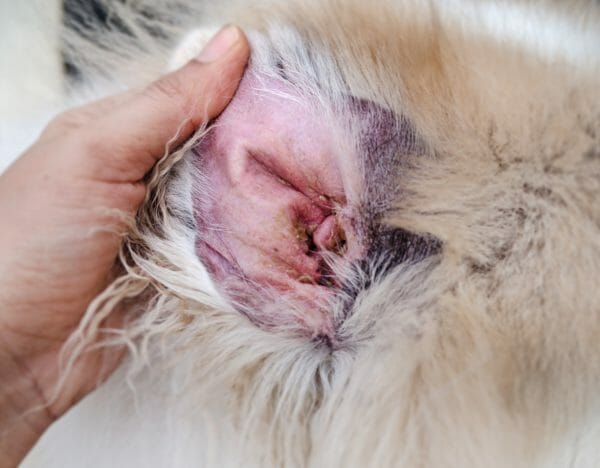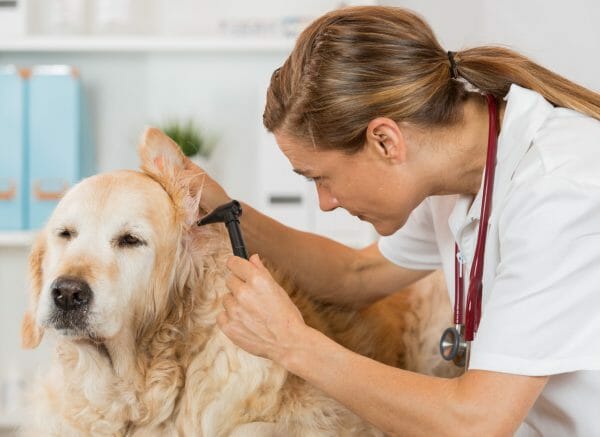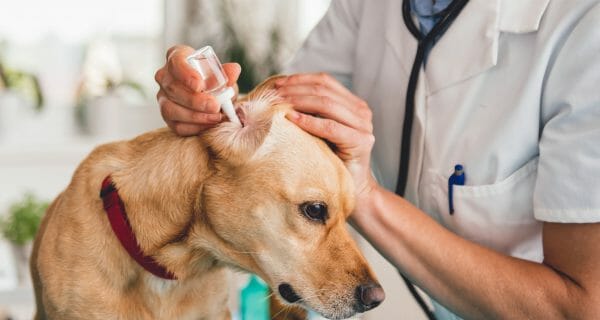Symptoms and Remedies
Whether it be the violent shaking of the head or the ruddy discharge clinging to the ear canal, the signs of a canine ear infection are often made more than apparent by the poor pup suffering from it. This type of infection typically brings great discomfort and irritation to a dog.
Because of this, plans should be made to have the dog treated by a qualified vet when an infection like this comes about. This will not only reduce the dog’s pain, but it will prevent the ear infection from spreading and further aggravating the situation.
What Are Ear Infections in Dogs?
Just like people, dogs can get ear infections. Ear infections are very common among canines, with 20% of dogs experiencing it. These infections can be passing—lasting only about a week or so in duration—or can be a chronic issue. Whatever may be the case, an infected ear is not something to ignore. The dog is most likely in substantial discomfort, so treatment is required.

Infection Prognosis
If the ear infection is treated quickly by a veterinarian, it should go away completely within a week or so. However, the severity of the infection could alter healing times. Therefore, it is always best to talk with the dog’s vet to determine the best course of action and expected recovery time. If the ailment affecting the ears is ignored, the condition will worsen—prolonging the problem indefinitely and perhaps leading to irreversible damage to a dog’s ears.
Are Ear Infections Contagious?
Although an ear infection itself is not transmittable to others, there are aspects of it that are. For instance, if pesky ear mites are the ones setting off the infection in a dog, these parasites could feasibly spread to other members of the household.
Ear mites spread by latching onto unsuspecting prey that brush by, so this makes it possible for those touching the dog to become the new home of an ear mite. It should be noted that although this is highly unlikely for humans or even adult dogs to contract ear mites, it is possible. Puppies are the most susceptible to getting ear mites from another dog.

Primary Causes of Canine Ear Infections
One of the common ways for an ear infection to plague an unsuspecting pup is through moistness in the ear, which provides ample breeding ground for bacteria. Dogs have the unfortunate capacity to retain moisture in their ear due to their hook-shaped ear canal.
There are two types of infection that are at the root of almost all infected ears:
- Bacterial: Bacteria accounts for half of all canine ear infections.
- Fungal: This type of dog ear yeast infection is common, although it is less frequently seen than bacterial infections.
Both of these infections occur when too much moisture is allowed to dampen the inside of the ear indefinitely. Bacteria and fungi can begin to develop and eventually cause an ear infection.
Outside Instigators of Ear Infections
Although most dogs suffer from ear infections caused by bacteria or fungi, there are several other factors that often leave a dog vulnerable to developing infected ears. The most common instigators of this infection are:
- Infestation of parasites, such as ear mites
- Swimming in bodies of water (water can get stuck in ears)
- A surplus of wax in the ears
- Disorders involving the endocrine gland
- Damage to the ear canal
- Moisture that has accumulated within the ears
Each one of these has been found to have the potential to facilitate an infection within the ears. Owners of water-loving dogs (such as the Newfoundland and Labrador Retriever) should pay special attention to their dogs ears after a swim.

Ear Infection Symptoms
When it comes to owning a dog, the symptoms associated with an ear infection should be well-known and kept in mind when observing the dog’s daily behavior. Dogs with infected ears often appear to be dismayed at the fact that their ears are endlessly itchy and inflamed. Even more, dogs can become increasingly irritated if the infection is allowed to go on without relief.
Besides their understandable irritation, dogs with contaminated ears may also display these symptoms:
- Swollen ears
- Bad smells issuing from the ears
- Scabs around the ears
- Incessant scratching at the ears
- Dark discharge from the ears
- Continuous shaking of the head
Symptoms like these in a dog should not be overlooked or assumed to get better on their own. A vet should be seen as soon as possible to identify the cause of the infection and to determine an appropriate treatment.

Ear Infections Should Not Be Overlooked
Delaying treatment will only cause the dog to suffer needlessly. Even more, the situation will worsen if the necessary treatment is withheld for too long. Consulting an informational article to find easy home remedies is not enough. Without understanding the root of the infection, at-home treatment is usually futile. The dog’s vet is the best source of helpful and accurate information regarding treatment. A quick fix is not always ideal when it comes to the health of an animal.
Canine Ear Infection Treatment
Before treatment can be determined, the vet will use an otoscope to thoroughly examine the canine’s infected ears. The vet will usually analyze a small sample of the discharge to determine the origin of the infection.
After this exam, the vet may prescribe a number of things to combat the infection. Topical ointments, oral medications, and anti-bacterial solutions are all viable treatment options. Whether it be a double ear infection or an infection caused by mites, the vet will use their sound knowledge and expertise to choose the best medicinal method of treating the infection.

How to Clean A Dog’s Ears
Following the diagnosis of an ear infection, the vet will need to clear discharge from the ears to help in the healing process. The vet will then explain to the owner how to keep their dog’s ears clean at home. It is recommended that all dogs have their ears rinsed out after spending time in water.
Quite simply, all that is needed to clean out a canine’s ears is a dog-approved ear infection solution and a cotton ball. After the solution is squeezed into the ear canal, a cotton ball should be held up to the ear and gently massaged against the ear.
For cleansing solution options, Chewy.com has some great options for sale, including:



